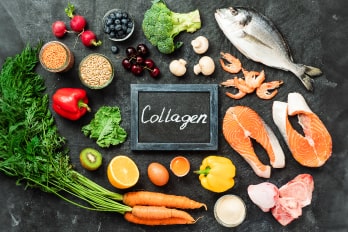

Marine Collagen vs. Bovine Collagen vs. Vegan Collagen
Collagen is one of the most important proteins in the human body, responsible for maintaining the structure, strength, and elasticity of skin, hair, nails, bones, and joints. As people are increasingly becoming more health conscious and investing in their appearance, collagen supplements have become extremely popular. But with so many options available in the market, you need to know which type of collagen is best for you? In this blog, we’ll explore the three primary types of collagen supplements—Marine Collagen, Bovine Collagen, and Vegan Collagen—and how they differ based on their sources and benefits.
What are the Types of Collagen Based on Sources?
Collagen supplements are primarily derived from three main sources: marine (fish), bovine (cow), and vegan (plant-based). Each of these sources offers distinct benefits and nutritional properties, and the choice between bovine vs marine vs vegan collagen often depends on dietary preferences, ethical considerations, and specific health goals.
1. Marine Collagen
Marine collagen, as the name suggests, is sourced from fish, particularly from the skin, scales, and bones. This type of collagen is predominantly made up of type I collagen, which is the most abundant collagen type in the body and plays a significant role in the health and appearance of the skin, tendons, and bones.
Marine collagen is primarily extracted from wild-caught fish such as cod, haddock, and snapper. The process typically involves hydrolyzing the fish's collagen, breaking it down into smaller peptides that are easily absorbed by the body. Fish collagen is often considered one of the most bioavailable sources of collagen due to its smaller peptide size, making it easy for the body to digest and utilise.
Marine collagen promotes skin elasticity, hydration, and overall firmness. Additionally, marine collagen supports joint health, making it a versatile option for those looking to enhance both their skin and mobility.
2. Bovine Collagen
Bovine collagen is derived from the hides, bones, and connective tissues of cows. This type of collagen is particularly rich in both type I and type III collagen, which are important for skin health, as well as the maintenance of bones, tendons, and muscles. Bovine collagen is a popular choice due to its wide range of health benefits and availability.
Bovine collagen is typically sourced from grass-fed, pasture-raised cows, ensuring that the collagen is free from harmful additives, antibiotics, or hormones. Like marine collagen, it undergoes a process of hydrolysis to break down the large protein molecules into smaller peptides, making them easier to digest and absorb.
In addition to its benefits for the skin, bovine collagen also promotes joint and bone health, muscle recovery, and overall body strength. This makes it a favourite among athletes and individuals recovering from physical injuries.
3. Vegan Collagen
Unlike marine and bovine collagen, which are sourced from animals, vegan collagen is entirely plant-based. While plants do not contain collagen in the same form as animals, vegan collagen supplements work by providing the body with the nutrients and building blocks needed to naturally support collagen production.
Vegan collagen is often formulated from ingredients like fruits, vegetables, and certain herbs, which contain antioxidants, vitamins, and minerals that promote collagen synthesis. Key nutrients in vegan collagen products typically include vitamin C (which is essential for collagen production), hyaluronic acid (for hydration), and amino acids (such as glycine and proline, which are the primary building blocks of collagen).
One outstanding example of vegan collagen is Panchamrit Vegan Collagen Powder. Enriched with 5000 mg of Vollagen, a highly absorbable and effective form of plant-based collagen. In addition to Vollagen, it contains Ayurvedic herbs like Anantmool, Manjistha, and Haldi along with 200 mg of hyaluronic acid, Vitamin E, and biotin, which work together to enhance skin elasticity, firmness, and reduce the appearance of fine lines and wrinkles, making it a complete solution for healthier, glowing skin, hair, and nails.
Vegan collagen supplements are not only a more ethical and sustainable choice but are also a great option for individuals who are allergic to or avoid animal products. By stimulating the body’s natural collagen production, vegan collagen helps improve skin hydration, elasticity, and overall health from the inside out.
When deciding between bovine vs marine vs vegan collagen it’s important to consider your individual needs, dietary preferences, and health goals. Marine collagen is a great option for those seeking quick absorption and focused benefits for skin elasticity and anti-aging. Bovine collagen offers a broader range of health benefits, supporting not only skin health but also joint, bone, and muscle strength. For those following a vegan or plant-based lifestyle, in between marine vs vegan collagen, vegan collagen provides an excellent alternative that supports the body’s natural collagen production, with added benefits for overall skin health, hydration, and firmness.
Ultimately, the best choice depends on your personal health and wellness goals. Whether you’re looking for an animal-based collagen with quick bioavailability or a plant-based option that aligns with your values, each type of collagen supplement can provide valuable benefits for your skin and overall health.
